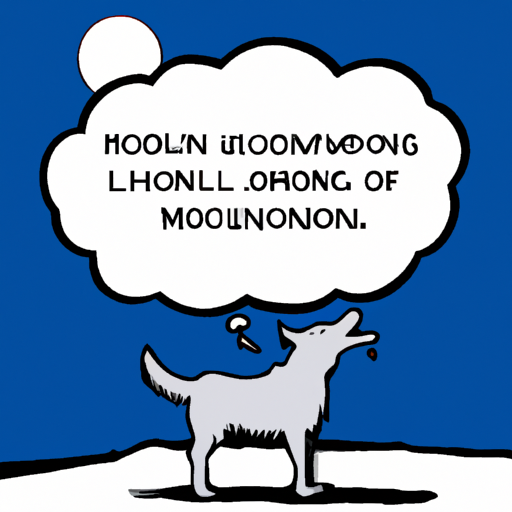Just as humans communicate through language, dogs communicate through a variety of vocalizations, one of which is howling. But what does it mean when your canine friend lifts their head and lets out a long, mournful howl? Let’s delve into the fascinating world of dog communication and find out.
H2: Dogs: The Howling History
Believe it or not, your dog’s howling behavior is rooted in their ancestral connection to wolves. As pack animals, wolves use howling as a form of long-distance communication, helping them to locate each other, warn of danger, or call for assistance. Here are a few reasons why your dog might be tapping into their inner wolf:
- Calling for attention: Just as a child might cry out when they’re feeling ignored, your dog might howl to make sure you’re aware of their presence.
- Expressing discomfort or distress: If your dog is experiencing physical discomfort or emotional distress, they might howl as a way of expressing their feelings.
- Responding to sounds: Some dogs howl in response to certain sounds, such as sirens or musical instruments.
H2: Decoding Dog Howls
While we can’t speak “dog”, understanding the context in which your dog is howling can give you some insight into what they’re trying to communicate. Here are a few things to consider:
- Timing: Does your dog howl at certain times of the day, or in response to specific events or stimuli?
- Body language: What other behaviors is your dog exhibiting when they howl? Are they pacing, whining, or showing other signs of distress?
- Changes in behavior: Has your dog’s howling behavior changed recently? This could be a sign of a health issue.
H2: When Howling Becomes a Problem
While occasional howling is normal behavior for dogs, excessive howling can be a sign of a problem. Here are some common issues that could lead to excessive howling, and what to do about them:
- Separation anxiety: Dogs with separation anxiety often howl when left alone. If your dog seems excessively anxious when you’re not around, you may need to work with a trainer or behaviorist to address this issue.
- Pain or illness: If your dog’s howling is accompanied by other signs of discomfort, such as changes in appetite or behavior, it’s time to visit the vet.
- Boredom or frustration: Dogs who are bored or frustrated might howl as a way of expressing their feelings. Providing plenty of physical and mental stimulation can help alleviate these feelings.
H2: How to Respond to Your Dog’s Howling
Responding appropriately to your dog’s howling can help strengthen your bond and ensure they feel heard and understood. Here are some suggestions:
- Don’t punish: Punishing your dog for howling can actually reinforce the behavior. Instead, try to understand what they’re communicating and address the underlying issue.
- Provide reassurance: If your dog is howling out of anxiety or fear, providing reassurance can help them feel more secure.
- Seek professional help: If your dog’s howling becomes a problem, don’t hesitate to seek help from a professional. They can provide guidance and strategies to help manage the behavior.
Frequently Asked Questions (FAQ)
Q: Why does my dog howl when I play the piano?
A: Some dogs howl in response to certain sounds, like music or sirens. It’s a normal behavior.
Q: Is howling a sign of pain in dogs?
A: It can be. If your dog’s howling is accompanied by other signs of discomfort, it’s best to consult a vet.
Q: How can I stop my dog from howling when I’m not home?
A: This may be a sign of separation anxiety. Consider consulting a behaviorist or trainer for help.



